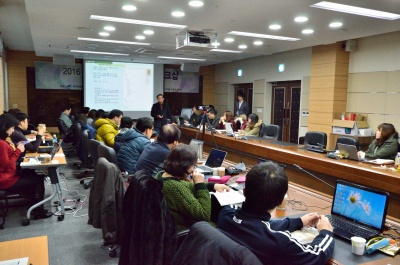About KADH
The Korean Association for Digital Humanities (KADH) was founded in May 2015 with the objective of contributing to the development of DH in Korea by facilitating the discussion of experiences, research, and perspectives among those engaged in or newly attempting DH research/education. It achieves this objective by providing educational resources on DH research methods/technologies for traditional humanities researchers and young scholars, by advising government authorities and scholarship advancement institutions on policy to foster DH, and by serving as a liaison between the Korean and international DH worlds.
Based in South Korea, the KADH is open to any individual, group, or institution that expresses interest in areas such as digital humanities research and education, multidisciplinary connections via digital methods, and/or the communication between academia and cultural content industry. The association primarily serves as a network for Korean-speaking scholars and industry leaders engaged in DH-related research, education, or content creation, but welcomes any individual interested in DH based in or related to Korea.
Please direct any inquiries to dhkoreadh@gmail.com
What is Digital Humanities?
- Digital humanities refers to new methods of research and education which utilize information technology, as well as related creative content production activities.
- Digital humanities endeavors to more meaningfully investigate and valuably utilize humanities knowledge in an age when expression and communication happen digitally.
- Digital humanities aims to develop humanities content and education methodologies to train future generations of "digital natives" in digital literacy.
Digitial Humanities in Korea
The founding father of digital humanities in Korea is Harvard University’s Edward Wagner who, from 1967 to 2001 digitally compiled 15,000 successful candidates of the Joseon period civil service examination in what is known as the Munkwa Project. Within the context of Wagner’s research, the Annals of the Joseon Dynasty Database was published via CD-ROM in the early 1990s, which allowed Korean-language humanities researchers to use digital data in their research for the first time. In the late 1990s, following the Asian Financial Crisis of 1997, the South Korean government initiated the IT New Deal Project, through which a tremendous number of historical documents stored at Korea's major archives were digitized.
The early 2000s saw the creation of associations such as the Korea Humanities Content Society (KHCS) and Korea Culture & Contents Technology Association (KCCTA), which seek to facilitate communication between digital technology and humanities knowledge, as well as the compilation of the Digital Local Culture Encyclopedia of Korea, the first truly "born digital" humanities data compilation project.
In recent years, interest in and support for DH in Korea has grown, facilitated by South Korea’s ICT infrastructure, legacy of humanities research, and the government’s Industrial Revolution 4.0 policies. Starting at the end of the 2000s, digital humanities and digital cultural content majors began to be formed at various universities around the country and continue to grow in number each year. In 2014, the National Research Foundation of Korea began a support program for research on digital humanities.
Association Objectives
- The KADH is an association open to any individual, group, or institution that expresses interest in areas such as digital humanities research and education, multidisciplinary connections via digital methods, and/or the communication between academia and cultural content industry.
- The KADH was founded with the objective to contribute to the development of digital humanities in Korea by allowing those engaged in or newly attempting digital humanities research and education to share their experiences, research results, and opinions, and receive feedback.
- The KADH provides educational resources on digital humanities research methods and technologies targeted toward traditional humanities researchers and young scholars, advises government authorities and scholarship advancement institutions on policy to foster digital humanities, and serves as a liaison between the Korean and international digital humanities worlds.
History
The KADH has held a variety of DH workshops and conferences, some in collaboration with other institutions or associations.
- 2015.05 KADH founded
- 2016.02 DH education workshop (4 days)
- 2016.02 Workshop jointly hosted with Korean Documentary & Cultural Research Center (5 days)
- 2016.02 Workshop on DH and classical texts jointly hosted w/ Yonsei Univ.’s Yeolsang Institute
- 2016.05 Introduction to Digital Humanities published (in Korean) (Hue Books)
- 2016.08 Workshop jointly hosted with Korea Univ.’s Research Institute of Korean Studies (1 day)
- 2016.12 Young Brains Forum jointly hosted with Korea Humanities Content Association & Academy of Korean Studies (1 day)
- 2017.01 Workshop for middle and high school teachers (2 days)
- 2017.11 Workshop at Seoul City’s Lifelong Learning College (5 days)
- 2017.11 First international conference with the theme of "DH and Storytelling" (2 days)
Members of the Board of Directors have also given presentations or provided policy advising as representatives of the KADH on topics such as digital curation, archive development, culture technology R&D project planning, collaborative translation, etc. for institutions such as the National Hangeul Museum, University of Seoul Museum, Jangseogak Archives, Korea Cultural Heritage Administration, Walkerhill Hotel & Resort, the Ministry of Culture, Sports, and Tourism, and more.
